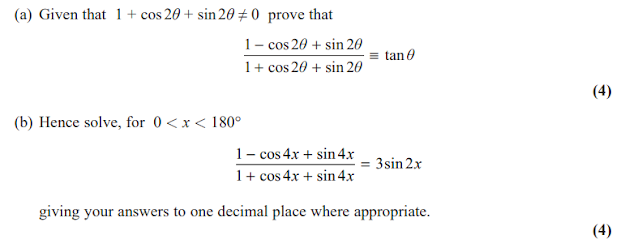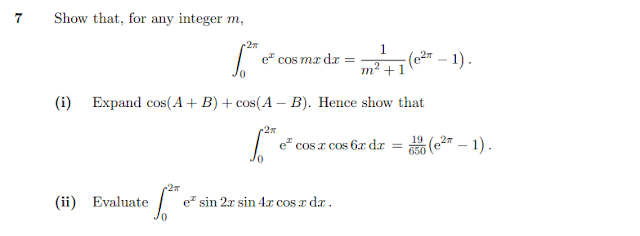[Exam Strategies] Using and abusing hints
Exam writers are nice people. Apart from me, of course.
Quite often you’re receiving hints and nudges to keep you in
the right direction. A couple times in section A and almost every question in
section B.
Since IB is a lil annoying with copyright I’ll take screenshots from A-level exams, but of course IB also does this.
Answers already given
In some sub-questions you’ll see the correct answer already
printed, coming after “Show that”.
Because the answer is given, you must make your method extremely clear to the marker. If they have a slightest suspicion you fudge your way to the answer they may choose to withhold the last mark (or the only mark in this case).
I’m now at the stage that I could kinda fudge my way to show
a printed result – but that’s after a ton of practice and a vague idea of what
I’m doing. You’re more than encouraged to use the printed answer to guide
your work, but you must explain how you got the intermediate steps.
And remember: if the answer is already given, you MUST use this answer to solve subsequent parts. No error carried forward marks will be awarded – you were given the correct answer. Even if you have obtained a different answer yourself, you should never continue with your own wrong answer… because it’s bloody wrong!
Find the links between question parts
Everything happens for a reason.
It’s not pure coincidence that part (a) shows up right
before part (b) – you should actively look out for links between the parts.
Here’s a great example, again from Edexcel’s A-level Maths October
2021.
Part (a) is slightly more difficult, but doable if you know
your trig identities.
Since the answer is given, you can just adapt and use it
for part (b).
Look at how parts (a) and (b) are related.
Oh, the argument for trig functions doubled.
Alright, so the LHS in the equation in part (b) is gonna be
tan(2x).
In many cases you’re allowed to ignore the hint (why would
you but hey), but IB means business when they say “hence”.
“Hence” means “hence”, not “otherwise”.
You must make use of
the printed result. And most likely you’ll be awarded a mark just by using them
appropriately.
In other cases though, the links may not be as
straightforward.
This is not applicable to IB but for students who plan to
apply to Oxbridge.
If you want to put your problem solving skills to a real
challenge, I challenge you to do STEP 1 and 2 papers. They don’t hold your hand
like the IB or the regular A-level. You are expected to find a creative way to
make the links between question parts explicit.
This is only for AAHL students.
The section before part (i) is straightforward. We have a term for it: bookwork.
Part (i) is somewhat scaffolded – follow their hint and you’ll
find a way to handle cosxcos6x. From there you could use part (i) to bring it
home, final answer given.
Remember that you are expected to use the printed answer
if this very expression shows up in part (ii).
Part (ii) is trickier – you first need to find a way to take
care of sin2xsin4x. How? A similar identity that you have to come up yourself.
(These are considered “routine” identities so you might as well learn how to
derive them.)
Ah, then you face another problem. And another problem. And
a couple more lines before you can call it a day. I won’t spoil the fun. :p
That’s all I have for today about using (and abusing) hints.
More often than not they’re trying to tell you to do
something clever. C:
Enjoy your summer vacation and we’ll talk about maths next
week!
Ciao!



Comments
Post a Comment